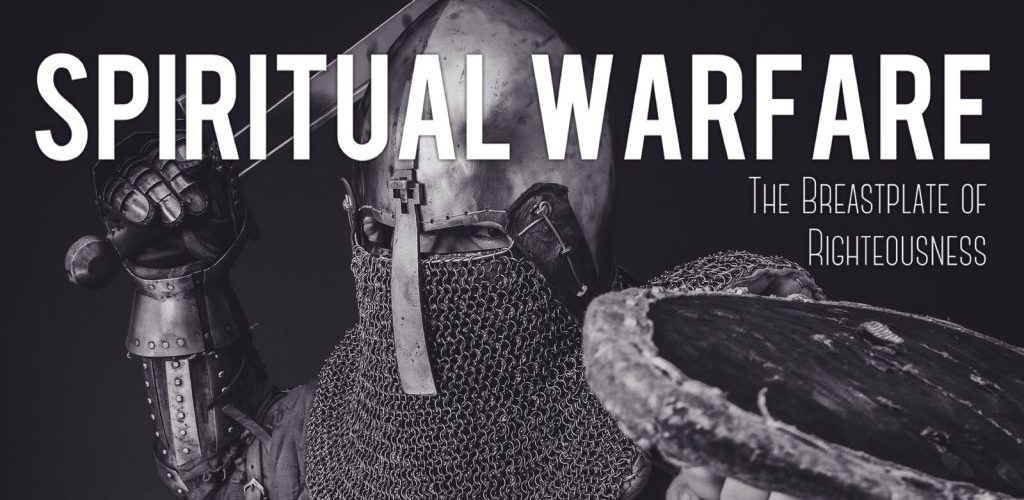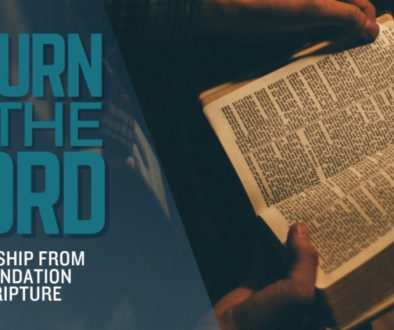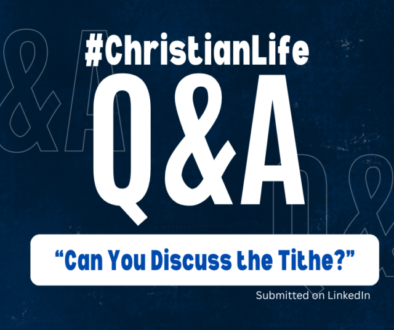Therefore take up the whole armor of God, that you may be able to withstand in the evil day, and having done all, to stand firm. Stand therefore, having fastened on the belt of truth, and having put on the breastplate of righteousness, and, as shoes for your feet, having put on the readiness given by the gospel of peace. In all circumstances take up the shield of faith, with which you can extinguish all the flaming darts of the evil one; and take the helmet of salvation, and the sword of the Spirit, which is the word of God, praying at all times in the Spirit, with all prayer and supplication.
Ephesians 6:13-18a
As we continue our discussion of “spiritual warfare” and the armor of God, we have established that we have an enemy who stands against us and against Truth, seeking to destroy us. We said that Truth is not a set of provable facts. Rather, the biblical idea is that truth must also be an “experiential reality,” and that Truth has a name: Jesus. Therefore to put on the belt of truth is to live in Jesus, and let every other outside influence be filtered through Him. This belt holds the rest of our armor together. We now turn our attention to the next item in our armor: the “breastplate of righteousness.”
What is Righteousness
In the New Testament, each time the word “righteousness” is used, it comes from a Greek root which generally implies “upright conduct of a person in civil society” or “obedience to the law.” It’s general usage in Roman society was used to describe a person who kept the law, not just because it was the “rule” but out of an obligation to civil society. For instance, one lexicon says,
“In Greco-Roman tradition a (righteous) person is one who upholds the customs and norms of behavior, including especially public service, that make for a well-ordered, civilized society.”
William Arndt et al., A Greek-English Lexicon of the New Testament and Other Early Christian Literature (Chicago: University of Chicago Press, 2000), 246.
Righteousness, then, is not a commitment to keep the law for the sake of the law itself. Rather, righteousness is a commitment to obey the law because we understand that our actions have direct impact on the relationship we have with others around us.
Righteousness In Relationship to God
That is not a complete definition of biblical righteousness, however. Righteousness is further understood by the people of the New Testament era, (Hebrews, Christians, and other pagan religions) as being connected directly to the legal decree of deity. In order to be considered “righteous” as a citizen of the community, your life must also be lived according to the will of that community’s deity. The New Bible Dictionary says,
“Referred to relations between men, righteous action is action which conforms to the requirements of the relationship and in a more general sense promotes the well-being and peace of the community… When we move from relations between men to those between God and men…righteousness implies a correct relationship to the will of God which was particularly expressed and interpreted by Israel’s covenant with God.”
B. A. Milne, “Righteousness,” ed. D. R. W. Wood et al., New Bible Dictionary (Leicester, England; Downers Grove, IL: InterVarsity Press, 1996), 1020.
The point I want to make is that righteousness is not just the understanding that a person is “innocent” of breaking civic law. If that were the complete definition, then the Apostle Paul’s declarations of his past life as a Pharisee would have been enough. However, once he had come into relationship with the God of the Universe through faith in Jesus Christ, Paul came to understand that righteousness is not just innocence. For true righteousness cannot be established outside of relationship with the lawgiver. (See Philippians 3:4-10.)
A Real Life Example
To give a simple explanation of what I mean, let me use myself as an example. I currently live in Uganda, Africa. I am an American citizen and therefore, in order to live here, it is not just a matter of following the law. I also must go through a process of “becoming known.” In order to get a missionary visa, I must introduce myself to the government, have a background check, and explain my intentions for living here.
Having done all of that, I am now committed to living a life of “righteousness” in regards to the law AND in relationship to the government of Uganda. I am here at their pleasure. Therefore, I refuse to conduct my life in such a way to cause offense to either the law or the lawgivers of this nation.
Righteousness Requires Obedience And Relationship
As Christians, our righteousness in God functions in much the same way. Once we are in Christ, our sinful past has been cleansed. All offense is expunged from our legal record (see 1 John 1:9) and we are transferred out of the kingdoms of this world and made citizens in the Kingdom of God. Our calling to righteousness, then, is about maintaining our right to live as citizens of this Kingdom. That righteousness is two-fold:
First, it requires ongoing relationship with God Himself. We must be in relationship with Him. Then, secondly, it requires obedience to His commands. These two things are inseparable in scripture. Let me give two examples:
Jesus said, “If you love me, you will keep my commandments” (John 14:15). Jesus is essentially saying that if you want to declare yourself righteous by living in relationship with the Judge and Lawgiver, you must also obey the rules put in place by Him! (This has great impact for those who ascribe to the hyper-grace movement, but I do not have the space to dive into that in depth here.)
My second example is a little more involved. Jesus, speaking of the final day of judgment, says this,
“Not everyone who says to me, ‘Lord, Lord,’ will enter the kingdom of heaven, but the one who does the will of my Father who is in heaven. On that day many will say to me, ‘Lord, Lord, did we not prophesy in your name, and cast out demons in your name, and do many mighty works in your name?’ And then will I declare to them, ‘I never knew you; depart from me, you workers of lawlessness.’”
Matthew 7:21-23
In this passage, I believe Jesus is actually making the same statement twice. First he says that people will call Him “Lord,” which is their way of making a claim of relationship: you are my Lord, and I am Your servant. However, He says that calling Him Lord is not enough. You must do the will of your Lord. You must obey Him.
He then reverses the same idea. He says there are going to be many who come claiming to have done the will of the Lord – prophesying, delivering people from demons, and other great works of God’s Kingdom – and yet his answer is “I never knew you.” There is no relationship.
Without both — obedience and relationship — you cannot be declared righteous biblically!
What is a Breastplate
To understand how righteousness fits in the armor of God, we must also look at the purpose of a breastplate. Simply, the Greek word for breastplate is “thoraka,” from which we get our word “thorax.” This word was used by Greek speakers to discuss the trunk of the body, itself (as we would today), as well as to name the piece of armor assigned to that part of the body.
The thorax of the human body is everything between the neck and waist. It is the trunk of the body. More importantly, it is the location of all our vital organs – our heart, lungs, stomach, intestines, etc. The breastplate, then, was one of the most vital pieces of your armor, because without it, your life is vulnerable at each blow from the enemy.
You can go into battle without your shield. You can potentially survive a fight without a sword or without shoes. It may make fighting more difficult, but it is possible. However, without a breastplate, one shot to your vital organs means the end. “Game over.”
The Breastplate of Righteousness
To put it all together, then, the Bible is telling us that righteousness – relationship with God and obedience to His command – is what guards all of our spiritual vitality at the heart level. Simply, we would say that the breastplate of righteousness guards our heart. Joshua Young-Gi Hong discusses the need to wear a breastplate of righteousness when he says,
A righteous saint protects his heart from Satan’s attack. If there is an element of iniquity in our life, the devil will accuse us in front of God. Also, the devil will echo a voice of guilt in our heart, “How could you commit such a terrible sin as a child of God?” Whenever we commit a sin, the devil will try to take advantage of it to make us fall. Thus, we should not allow any room for the devil to accuse us and make us feel guilty.
Joshua Young-Gi Hong, Building a House of Prayer: 18 Prayer Models for Approaching God’s Throne, ed. David A. Womack (Alachua, FL: Bridge-Logos, 2008), 33.
The breastplate of righteousness, then follows the belt of truth in this way: We first step into the Truth, that is Jesus, by being born again through faith in Him. That faith become the filter for everything we let into our lives. Then, the breastplate of righteousness becomes an added layer of protection as we make it our heart’s goal to remain in close fellowship with the Lord and to obey his every command. We refuse to let our hearts be captured by sinful passions and demonic temptations.
In fact, the reverse is also true. Paul writes that those who live unrighteous lives actually suppress truth (see Romans 1:18)! Obedience to the Truth (which is Jesus) is the definition of righteousness (see Romans 2:8 and 2 Thessalonians 2:12).
Removing False Breastplates
This is not legalism. In fact, legalism itself is a piece of the devil’s false armor. To wear a breastplate of legalism is to attempt to protect our heart from sin outside of relationship with God. It is a form of pride working outwardly as self-righteousness. We must lay down any form of self-righteousness in order to find the protection of God’s righteousness.
The breastplate of righteousness is also not built on the foundation of our shame or self-loathing. This could lead to a breastplate of false-humility, or worse! Holding on to our past sins and condemnation could leave gaps in the true armor God intended to cover us completely.
While our own righteousness is fully dependent on Jesus Christ and His forgiveness, it must become our own identity in this world. It is a good thing to be declared righteous by Him, and to also have our actions and therefore our reputation be declared righteous by others. To be sure, we will eventually lay our crowns at Jesus’ feet, but our righteousness in Him will cover us for eternity. It is our identity.
Put On The Breastplate of Righteousness
Our goal, then, is to put off all the old self with its pride, sinful passions and desires, and all the condemnation from our past, and to daily put on God’s righteousness, given to us through Jesus Christ, as a protection for our hearts. He must be our love and our passions must be to do His will.
When our lives are lived in Truth and our hearts are guarded by righteousness, then it will be easy to put to death all that is earthly in us (Colossians 3:5), and to stand in the peace of Christ. That, of course, will take us to the shoes of the gospel of peace, in the next post.
Let’s Connect
As always, I would love to hear your thoughts, questions, and testimonies in the comment section.
If you want to keep up with the blog and all my other #ChristianLife and #GospelLeadership content, I would be honored to have you sign up for my weekly roundup newsletter, below. I promise not to spam you!
You can also join me on Facebook, Instagram, Twitter, and Parler, to continue the discussion on this post and more!
Photo by Henry Hustava on Unsplash
Unless otherwise indicated, all Scripture quotations are from The Holy Bible, English Standard Version®, copyright © 2001 by Crossway Bibles, a publishing ministry of Good News Publishers. Used by permission. All rights reserved.”



